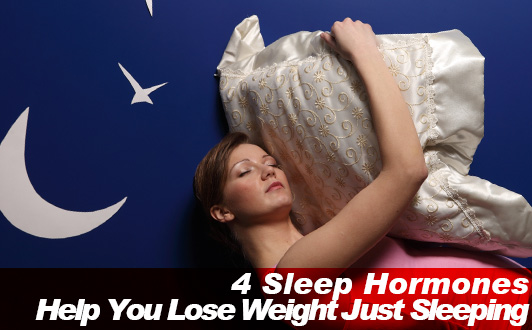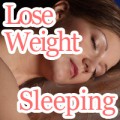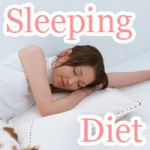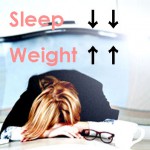
Getting enough sleep at night makes a big difference in your ability to lose weight. Without sleep hormones you might as well be putting on weight. Don't worry there are ways to ensure you get the hormones for sleep you need to succeed in weight loss.
Does getting enough sleep keep your from putting on weight?
Sleep hormones are the hormones most involved with sleeping. They are intersection between sleep and hormones linked to sleep deprivation and other sleep related problems. These hormones are released during sleep so getting enough sleep at night can help you get a healthy release of hormones for weight loss.
When you sleep your body uses this time to restore the cells in your muscle and skin. In particular the growth hormone is released in the body while you sleep. Sleep hormones play an active role in your metabolism in addition to helping you make out good with your diet.
In this sleep hormone Slism, we will introduce the 4 hormones for sleep that you need to control to ensure success in your routine with simple tips to avoid the common pitfalls standing in your way.
Quick Sleep Hormones
Hormones for Sleep - Cortisol (Stress Hormone)
Cortisol is a hormone synthesized out of the adrenal cortex of your adrenal glands. Due to the fact that the level of cortisol in your body increases are you are stressed, cortisol is sometimes referred to as the "Stress Hormone." It affects the renewal of fat, sugar, and protein in your body.
Effect of too much cortisol in your body
- Weakened immune system making you more likely to suffer from minor illnesses such as the cold
- Loss of muscle mass slowing down your metabolism
- Changes in skin such as bruises and having a flushed round face
Cortisol helps you burn energy while you sleep
Eating 2-3 hours before sleeping blocks cortisol
When you eat before going to bed your body no long needs to burn away energy stored away in the body. Instead it uses the energy you get from eating 2-3 hours before sleeping. This in effect renders the effect of cortisol on your energy burning metabolism useless.
Avoiding eating before you go to sleep allows your body to metabolize energy stores such as fat through the use of cortisol. Never eat before going to sleep!
Hormones for Sleep - Somatotropin (Growth Hormone)
As you would have guessed the human growth hormones helps your body grow and evolve to better fit your current level of activity responding to the demands you put on your body. As a child, this hormone quickly sped up the growth of your body helping your increase in height and build strong bones.
Growth hormones are primarily release while you sleep
Although you may not think that allowing your body to synthesize the growth hormone is that important after becoming an adult, getting enough sleep regularly serves as a natural way to slow down the effects of again indispensable to women and men alike whether you are on a diet or not. The secret to ensuring a healthy release of growth hormones in your body is simply sleeping on a regular schedule.
Somatotropin is said to be the hormone most tied treating obesity. It plays and active role in your metabolism ensuring you burn the calories you need to lose weight. However, lack of sleep inhibits the release of the growth hormone slowing down your metabolism.
Hormones for sleep - Leptin
When you are just finishing a meal what helps you reach the level of fullness you could call satisfactory is the synthesis of leptin out of fat cells serving to satisfy your appetite.
Eating too much can cause your fat cells to react in a way that affects the release of leptin in your body. Leptin by way of your sympathetic nerves helps your body break down fat. However when you don't get enough sleep the synthesis of leptin by your body is drastically lowered affecting your ability to burn fat.
Getting less than 6 hours of sleep a day is said to be the point at which your sleeping habits begin to affect the synthesis of leptin by your body affecting your appetite making it easier to overeat not to mention lowering the efficiency that your body burns off excess energy.
Hormone for sleep - Ghrelin
Ghrelin is a hormone synthesized out of your stomach causing your to want to eat, feel hungry, and just want to eat more.
Although the level of leptin decreases when you lack sleep, your body reacts to this by releasing ghrelin causing you to start to feel hungry. The increase of ghrelin in addition to making you hungry slows down your metabolism making it easier to gain weight.
Getting a good night of sleep helps prevent unnecessary amounts of ghrelin from ruining your chances of succeeding in your diet.
Fixing lack of sleep to help you recover from weight gain
Just when you were thinking that just simply getting enough sleep was going to help you get your sleep hormones in line, there's more!
The release of sleep hormones such as the growth hormone requires that you go into deep sleep. Eating before you go to sleep is the worst enemy to cortisol. Keeping a healthy balance of leptin and ghrelin is essential for a healthy diet. Ensuring that you are doing all you can do to promote the release of sleep hormones may as well be the key to getting the results from diet and exercise you deserve.
Simply put, getting at least 8 hours of sleep is the bottom line when it comes to ensuring a healthy release of sleep hormones by your body.
Checkpoints to help you get sleep hormones
Don't drink before you sleep!
Drinking alcohol before going to bed my affect the quality of your sleep and possibly interfere with your ability to get deep sleep needed to trigger the synthesis of sleep hormones by your body.
Warm up your body before sleeping
Taking a bath or hot shower before going to sleep is an effective way to warm up your body before going to sleep. Warming your body prior to going to sleep is said to help you relax ensuring a good night of sleep and the deep sleep you need for sleep hormones.
Avoid light when you sleep
Watching TV or spending too much time in front of your computer screen before going to sleep exposes you to light that has the effect of stimulating your brain causing you to feel less tired. Being exposed to light such as that outside or from an electronic device such as your TV or computer inhibits the synthesis of the hormone necessary to start sleeping





